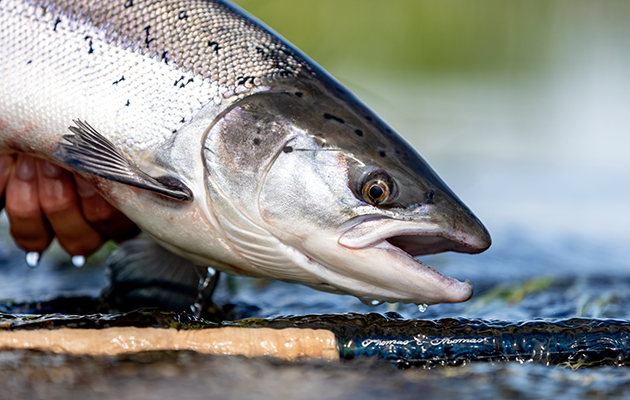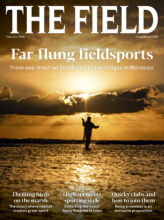Speak to those who are fluent in their ways for the truth about Russia’s salmon rivers, says Charlie White
There’s much to consider before embarking on salmon fishing in Russia. Decide whether you want lots of fish or big fish, says Charlie White, and then turn to those passionate about the rivers to determine which of the many to choose.
For a fishing trip a little closer to home, we pick the top 10 trout rivers in the UK and Ireland for fly fishing – have you fished them all?
SALMON FISHING IN RUSSIA
Salmon fishing in Russia has been available to adventurous anglers for more than 25 years and yet it’s still shrouded in mystery, confusion and an awful lot of hot air. “It’s too easy… too far… too elitist…” are proclaimed with confidence by people who’ve never been there.
That’s not to say that everything you’ve heard about Russia is untrue or that there aren’t confusing aspects to it. So how should you decide where to go and when?

Wading in the Varzuga, which requires floating lines from the first week of June.
One of the biggest miscalculations that anyone can make when investigating a Russian river for the first time is to assume that they must all be the same. Just turn up, lob a fly in, land a 35-pounder before trying out the vodka – surely that’s all there is to it? Well, not quite. Every Russian river has its own characteristics and you have to find the one that’s right for you.
The first question you should ask, then, is: “Why do I want to go?”
Have you got tired of flogging the same old water with dwindling returns? Have you actually caught quite a lot of fish but really want to hang a picture of a monster above your office wall before time runs out? Is time catching up with you and whilst you want to wade your usual beat, the fact is that it is getting harder and the returns are not worth the increased effort? Do you just want to see something different? Do you need to save up for the trip or is it a lifetime ambition to be fulfilled no matter the cost?

You need to be fit to tackle the rapids-strewn bottom of the Yokanga, reached by helicopter.
All of these and many more are questions that should be asked, challenged and examined before working out where to focus your attention, because one of the greatest secrets of the Kola peninsular – too easily dismissed by many – is that there really is something for everyone; you just need to work out which option would suit you.
Let’s take the more usual scenario of why Russia might appeal to you. Much as we love all of our fishing trips, the fact is that most of us like to catch something – or at least feel that, had we been vaguely competent, we would have been in with a real chance of hooking fish. Alas, this is not always the case and many a fishing trip has become a bit of casting practice while making the most of the opportunity to catch up with old friends. Fine for some of the time but it lacks that intensity that used to bring us back year on year. To land a few fish you need to be in an environment where a few fish swim – a simple but often overlooked truth. Russia offers that and it offers that in spades in various rivers.
THE KOLA
Fundamentally, the Kola can be split into two different offerings: lots of fish or big fish. Anyone offering shoals of big fish is, at best, exaggerating and anyone offering small volumes of small fish should probably revisit their marketing strategy.
The ‘lots of fish’ options are the Varzuga system and the Ponoi.
The Varzuga is referred to as a ‘system’ as it offers four lodges along its banks, each opening according to the historic run timings of the fish.

A fine Yokanga salmon.
In early May the ice breaks and the first push of salmon begins. You can expect cold weather, to fish with Skagit lines and plenty of salmon. The river is huge at that point, which concentrates the fish nearer the banks and so long casting is not normally necessary. As the season carries on, fresh fish run the river every day but the weather perks up and floating lines are normally broken out around the first week of June. After five or six weeks the run is pretty much over and the whole system closes for the year.
Four different lodges mean that each section offers varied fishing but the common denominator is miles and miles of perfect fly water with fresh, extremely aggressive fish fresh from the sea. It is not easy – anyone who has been there will attest to that – but the averages mean that you can expect to land around five to six fish per day with naturally many lost along the way. This gives you the confidence to try things and to learn.

Choosing a fly for the Varguza.
Many of us go so long without even hooking a fish that we go into our shell and simply do the same thing over and over again, which teaches us nothing. To be able to land three or four fish before lunch and then try something completely different for a few hours is a real luxury and accelerates the learning curve rapidly. It also tends to prove that if you have fresh fish in front of you, more tactics work than don’t, which gives you confidence in other situations.
You cannot expect big fish here but you can expect to be fishing water that is holding thousands of fresh fish. That can be mentally tough as it also means that those who work the hardest, put out the best line and spend the most hours on the water will catch more than those who don’t. When there are lots of fish around, salmon fishing is not a lottery: effort and skill will be rewarded.
THE PONOI
The Ponoi is also a big numbers river although fishing is focused on one base, the famous Ryabaga camp, where comfort levels have been hugely improved over the past few years. It differs from the Varzuga in that it has its main run of fresh-run fish in the autumn. Some of these will run, spawn and return as you would expect but some of these amazing fish will run the river in September/October, spend the winter under the ice and then spawn the following autumn – a truly extraordinary phenomenon; these fish are known as osenkas.

Casting on the Yokanga.
The spring fishing is mainly for those fish that ran in the autumn and stayed under the ice for the winter – they stay silver and fight just as hard as a fresh-run one. The numbers of fish per week are slightly lower than the Varzuga but there is more chance of a 20-pounder.
The guides here are excellent and they make good use of the boats, which form the mainstay of the fishing day. Roping down with rods fishing either side, the guides know exactly the sites of the main lies and the tactics you should employ, and they make a real difference to numbers of fish landed at the end of the week. A toast to them in the Big Tent at the end of the week is heartfelt.
BIG FISH RIVERS
At the other end of the spectrum are the big fish rivers: the brawling and awesome territory of the North Coast hosts the mighty Yokanga and Kharlovka rivers, both revered and rightly so. The Yokanga now has two lodges that offer very different fishing. The main lodge is located in the middle of the fishable section of the river and, again, has been very much improved with upgrades being undertaken every year. Here you can expect to be picked up by helicopter in the morning, flown to your beat with your guide and commence fishing for seriously big salmon.
It is tough and you have to make the most of your opportunities as, as yet, no one has landed a really big fish whilst daydreaming. You will be fishing stunning water and every time you hook even a grilse, you will feel that jolt of adrenaline as every part of your mind screams, “this is it, this is the big one”. Knowing that you can land a fish of a lifetime on every cast focuses the mind and you fish with your heart in your mouth.
What constitutes a big fish? To some it will be the biggest they have ever landed, to some it will only be one they would like to take a mould from and for some it will be anything over 40lb – whatever your definition, it is here that you can achieve it.

A fish jumping on the Varzuga.
The second Yokanga option is for hard-core fitness freaks only. Situated at the bottom of the river – and only open for the first five weeks of the season – this camp offers a rapids-strewn river and wading over rocks the size of cars (well, lawn-mowers anyway). The really big fish run the river first and it is here you can intercept them, though hanging on to them is a different matter. Only silver bullets are landed but only piscatorial James Bonds need apply.
The final Kola option (there are others but, frankly, they are not really worthy of consideration unless you have fished everywhere else and want to tick another one off) is the famous Kharlovka.
Three awesome rivers – the Kharlovka, Rynda and everyone’s favourite, the Eastern Litza – are combined to offer a very senior fishing package. Now in Russian ownership, nothing has been spared and it offers fabulous fishing in extreme comfort. It is not cheap but it is not meant to be and for those who can afford it, it offers an irresistible lure.

Four lodges offer varied fishing on the Varzuga.
When to go? Each of the four rivers has a four- to five-week run of multi-sea-winter fish and after that the grilse and summer salmon run, when you are also taking more of a chance with summer weather. The lodges have all been running for more than a quarter of a century and meticulous records have been kept, so it really is a question of getting what you pay for; the price of each week will reflect the long-term average.
You can expect an all-in cost from the UK of around £5,000 for a week on the Varzuga, which might average 20 fresh grilse, or expect to pay up to £25,000 for a prime week on the Kharlovka.
One common factor to all the rivers is a depth of acquired knowledge. The people running them have been doing it for many years and if you talk to them you’ll appreciate the passion these rivers engender.
My advice, then, for anyone contemplating fishing for Russia’s Atlantic bounty is to chat it through with those who know and love the rivers, not to those who’ve plenty of opinion but have never fished there.
Charlie White is the director of fishing at Roxtons





